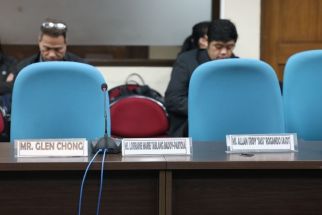EDITORIAL – End of combat
May 3, 2003 | 12:00am
 The boys and girls of the mightiest army in the world are homeward bound, and the people of Iraq are on their way to setting up their own go-vernment. Only two factors are spoiling George W. Bush’s victory parade. One: Saddam Hussein remains unaccounted for. Two: those weapons of mass destruction (WMD) simply refuse to be found.
The boys and girls of the mightiest army in the world are homeward bound, and the people of Iraq are on their way to setting up their own go-vernment. Only two factors are spoiling George W. Bush’s victory parade. One: Saddam Hussein remains unaccounted for. Two: those weapons of mass destruction (WMD) simply refuse to be found.
The top Iraqi officials who have surrendered or been arrested have so far failed to lead coalition forces to Saddam or his remains. The officials also continue to insist that there are no weapons of mass destruction in their country. Lest anyone has forgotten, the supposed presence of those WMD — not the liberation of Iraqis from Saddam – was the reason for this war, and the reason the coalition brushed aside the objections of the United Nations Security Council.
Despite such setbacks, the US president is happy enough with the outcome of the war. Those who supported the coalition, including the Philippines, are also happy to see the Iraqis enjoying enough freedom to march in the streets, demanding that coalition forces leave their land. The success of the military campaign has so emboldened Bush that in his speech yesterday declaring major combat in Iraq over, he vowed to continue confronting rogue states that support terrorism. The world can also expect more manifestations of his unprecedented doctrine of pre-emptive strike. "We will continue to hunt down the enemy before he can strike," he vowed.
America promised the world a brief, decisive strike. Three weeks to invade a sovereign state and topple a regime was certainly short enough. America promised that the coalition would liberate Iraqis from a cruel regime. In this the coalition also deli-vered.
And yet unease lingers – over the absence of Saddam and the WMD, over the sidelining of the UN, over pre-emptive strikes, and over which regime is next in America’s line of fire. Whether or not democracy takes root in Iraq remains to be seen. How far are the Americans and British willing to go to achieve that aim? Of greater concern to other authoritarian Arab regimes, several of which supported the strike against Saddam: Will the coalition stop at Iraq?
Only time will tell if the world has become safer with Saddam taken out. For now there is relief as coalition forces head home and the difficult task of rebuilding Iraq gets underway.
BrandSpace Articles
<
>
- Latest
- Trending
Trending
Latest
Trending
Latest
Recommended

February 4, 2025 - 1:27pm




























